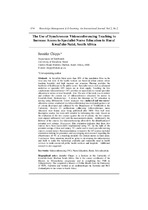The use of synchronous videoconferencing teaching to increase access to specialist nurse education in rural Kwazulu-Natal, South Africa
Abstract
ABSTRACT: In KwaZulu-Natal more than 50% of the population lives in the rural area but most of the health workers are based in urban centres where teaching hospitals and high incomes are common. Nursing provides the backbone of health care in the public sector. Specialist nurses such as advanced midwives or specialist HIV nurses are in short supply. Teaching via live synchronous videoconference (VC) provides an opportunity to extend specialist education to nurses at rural hospitals. AIM: The aim of the study was to review and evaluate the current use of videoconference education for nurses in KwaZulu-Natal.METHODOLOGY: A review the literature on VC education in nursing using bibliometric review strategies was conducted and two nurses’ education courses conducted via videoconferencing was evaluated against a set of criteria developed and validated by the Department of TeleHealth at the University. RESULTS: 81 publications addressing videoconference nurse education were found, most being published after 2000. Over half were descriptive studies, but were still valuable for informing this study. Based on the evaluation of the two courses against the set of criteria, the two courses were aligned sufficiently well with the measurement criteria. Additionally, the delivery of the courses via videoconferencing allowed for the identification of potential cost savings.DISCUSSION: This evaluation indicates that these two courses have been successfully implemented using VC. In the light of the potential savings of time and money, VC can be used to teach specialist nursing courses to rural nurses. Recommendations to improve the VC courses included orientation training for presenters and encouraging more research regarding the effectiveness of VC as a teaching modality for clinical nurses in rural areas. CONCLUSION: More attention should be given to developing the infrastructure and skills to make this technology available and commonly used in health services in under-resourced public health services and hospitals. Additional research is also suggested.

